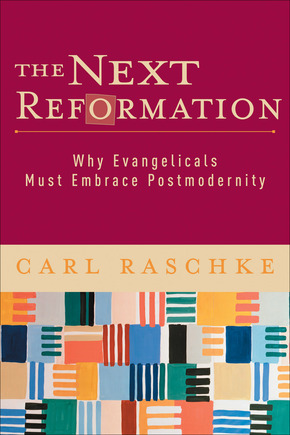Carl Raschke: The Next Reformation
 Carl Raschke, The Next Reformation: Why Evangelicals Must Embrace Postmodernity (Grand Rapids: Baker Academic, 2004), 235 pages.
Carl Raschke, The Next Reformation: Why Evangelicals Must Embrace Postmodernity (Grand Rapids: Baker Academic, 2004), 235 pages.
Perhaps no other word is feared (or misunderstood) by evangelicals in the current theological vocabulary than postmodernism. Read most any evangelical Christian publication and you will read some article or editorial warning about the dangers of postmodernity. For good measure, the naysayers of postmodernism will throw in names such as “relativists” and “nihilists” when speaking of those who adhere to a postmodern way of thinking. Sadly, though, very few evangelicals have seriously and critically dealt with postmodernism and its consequences for theology and the church. The work of Stanley Grenz, John Franke, and Brian McLaren stand out as examples of evangelicals attempting to deal honestly with what postmodernity means for evangelical Christianity. Carl Raschke is another example, although he is by no means a newcomer to the conversation. His seminal work, The End of Theology, is believed to have started the postmodern debate within evangelicalism.1 In The Next Reformation he continues his intelligent and thought provoking work in postmodern theology.
Raschke’s critique of evangelical theology is at times biting, but one senses a refreshing honesty and concern. The hypothesis of the entire book is that evangelicalism has bound itself too tightly to the modernist “isms,” including foundationalism, presuppositionalism, and common-sense realism. Raschke believes, and rightly so, that modernism is the spawn of the Enlightenment Project and that the idealism and extreme rationalism of that movement have failed and are passing away. On the horizon, or right here and now—depending on varying dates and definitions, postmodernism looms as the intellectual amniotic fluid of our time. Evangelicals, Raschke argues, have been down right resistant to the postmodern metamorphosis in thought, reacting the same way they did to liberalism and secular humanism. Raschke does believe that postmodernism is congenial with evangelicalism and can help the evangelical church stay true to its Reformation roots.

Carl Raschke (PhD, Harvard University) is professor and chair of the department of religious studies at the University of Denver, where he has taught since 1984. In addition, he serves as an adjunct faculty member at Mars Hill Graduate School and is the author or editor of twenty books.
For Raschke, the Reformation triune theology of sola fide, sola scriptura, and the priesthood of all believers (here worshippers) is best understood from the postmodern perspective. Faith is not based on reason or epistemology, as the post Enlightenment movement would have us believe. To the postmodern, faith “Shatters the idols of the age” (114). Faith is not a presupposition or a foundation, but the foundation. Out of this grows the concept of sola scriptura. Raschke is right to point out that evangelicals have too easily equated inerrancy with the Reformation doctrine of “by scripture alone.” A postmodern reading of this doctrine sees that the authority of scripture lies in the fact that it is promissory speech of the Almighty (135). The bible is true and authoritative because it is the word of God, not because it can be verified factually or historically as modernist liberals and fundamentalists like to think. If this is true—and we as Christians, particularly evangelical Christians, really believe it to be true—we will live it out. Postmodernism also provides the church the chance to actually implement the priesthood of all worshippers. Thinkers such as Michael Foucault tell us that modernism structures things hierarchically or vertically, while postmodernism views things relationally or horizontally (149). It is in this setting that all the church ministers to all the church and the world.
Category: Ministry, Winter 2006


